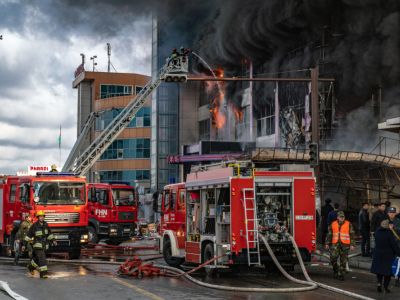Former president George Bush, reacting to the deadly terrorist attacks in the United States, made a strong plea here Thursday for removing constraints that hamper the ability of the US intelligence community to penetrate terror groups.
"The world we live in today is very different than what it was when this week began, very different," the father of President George W. Bush, told a business conference, referring to Tuesday's terrorist attacks against the Pentagon and New York's World Trade Center feared to have killed thousands.
"We should make sure that these agencies responsible for protecting American citizens against terror are not forced to fight this critical battle with one armed tied behind them."
The former president, who served as director of the Central Intelligence Agency (CIA) from January 1971 to January 1977, noted that the intelligence community had been criticized in the past for maintaining links with "unsavory people."
"People tried to make a lot out of the fact that at one point the intelligence community dealt with [former Panamanian strongman] Manuel Noriega," he said.
"Well, they did; but it isn't a nice, clean business. And if you're going to infiltrate some cell somewhere or a terrorist cell, you have to deal with people that are willing to betray their country, people that are willing to betray their friends, people that want money or other things."
In December 1989, the elder Bush ordered US forces to invade Panama and Noriega was arrested and taken to Florida to stand trial. The trial began in 1991, and Noriega's attorneys argued his wealth largely came from the CIA, for which Noriega was an informant, and not from illegal activities.
Noriega however was convicted of drug trafficking and money laundering, and remains in a Miami federal prison.
"I think we're going to find that we have to do more in the way of human intelligence and that means we're going to have to take a broad look at exactly what constraints the intelligence community, not just CIA, but the community itself, is operating under," the former president said.
"I think it's important to recognize that all this new Internet technology that you guys know so much about has to be reviewed, in a sense, to see whether we're constraining our intelligence communities from getting after the culprits that may be American citizens. It's not pleasant," he noted. "You have got to always respect the privacy and right of an American citizen."
The United States fields a total of 13 intelligence-gathering organizations, including the CIA, the National Security Agency, responsible for electronic eavesdropping around the world and the Defense Intelligence Agency.
US security experts have repeatedly complained that US intelligence agencies rely too much on technical means of data collection, such as spy satellites and electronic eavesdropping devices, at the expense of human intelligence.
Larry Johnson, a former deputy director of the State Department's counter-terrorist office, said the CIA was having trouble adapting to challenges of the post-Cold-War era, including the new strength of extremist Islamic groups.
"To penetrate these organizations, you don't have diplomatic cocktail parties where we would traditionally recruit spies from other countries," he told MSNBC.
Johnson said US intelligence operatives should not hesitate to get their hands dirty, if that is what it takes to put an end to terrorism -- BOSTON (AFP)
© 2001 Al Bawaba (www.albawaba.com)









